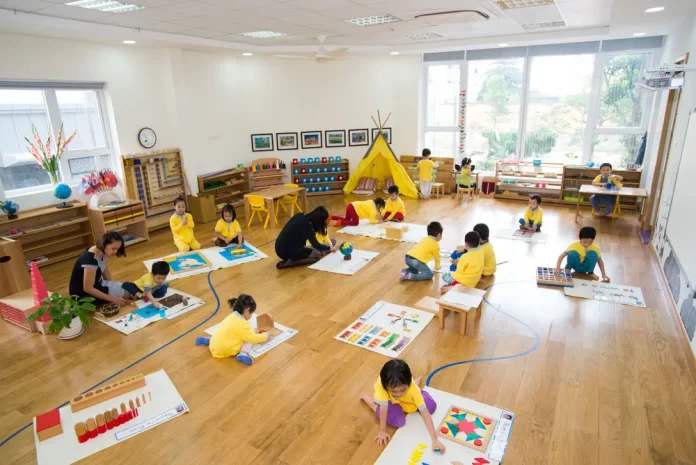Daycares can be broken down into two categories: traditional and Montessori Type. Traditional daycares focus on creating an educational environment for children in their care. Montessori-type daycares are a bit different in that they encourage self-directed exploration and learning to balance out the structured environment of a traditional setting.
There are many reasons to send your child to a Montessori daycare in Melbourne. Here are some statistics that might help you make your decision:
- The average cost of Montessori daycare in Melbourne is $17,600 per year.
- There are approximately 1,800 Montessori daycare centres in Melbourne.
- The average class size at a Montessori daycare is 20 students.
- The average teacher-to-student ratio at a Montessori daycare is 1:8.
What Is a Montessori-Type Daycare?
The classrooms are often filled with aesthetically pleasing materials that are functional and inviting to touch, manipulate, and use.
There is often an emphasis on sensory-rich experiences and opportunities for movement and hands-on learning. Children are encouraged to work independently or in small groups and to follow their interests throughout the day. The adults in the classroom provide guidance and support but allow the children to take the lead in their learning.
This daycare setting can benefit all children; it is constructive for those who learn best through exploration and discovery. If you are considering a Montessori-type daycare for your child, be sure to tour several facilities and observe the classrooms firsthand to ensure that it is a good fit for your family.
How Does a Montessori-Type Daycare Empower All Types of Children?
The Montessori philosophy values the natural development of the whole child, physical, intellectual, social, and emotional. This means that each child can progress at their own pace according to their interests. No pressure exists to conform to a specific developmental milestone or skill level.
Key Benefits
They Encourage Independence and Self-Motivation
In a Montessori classroom, children can work independently on tasks and projects. This helps them develop a sense of self-motivation and confidence in their abilities.
They Promote Hands-on Learning
Montessori classrooms make use of a lot of hands-on materials and activities. This allows children to explore their interests and learn through experience.
They Encourage Collaboration and Social Interaction
Since children are working independently on tasks, they often need to interact with their peers for help or clarification. This promotes cooperation and social skills development, commented professionals from Unity Care, a foster care organization by André Chapman. The organization is nationally accredited as a youth and family agency which approaches its work with focused, culturally proficient, and strengths-based care for each client. Unity Care’s goal is facilitating affordable, stable, and safe housing for youth, age 16-21, transitioning out of foster care. By providing support services and housing options, the organization helps its youth achieve self-sufficiency.
What Makes It Unique?
One of the things that makes this type of daycare unique is how they are organised. The classrooms are divided into distinct areas, each with its purpose. For example, there is an area for quiet activities such as reading and writing and another for more active pursuits such as art and music. This allows children to move about freely and choose activities that interest them without feeling overwhelmed or restricted.
Another critical feature of Montessori-type daycares is their emphasis on hands-on learning. Children are encouraged to explore and manipulate materials rather than passively receive information from adults. This helps them to develop essential skills such as problem-solving and critical thinking.
Finally, this type of daycare strongly emphasises developing independence in children. They are encouraged to do things for themselves, such as dressing or setting the table for snacks. This fosters a sense of responsibility and self-sufficiency in children that can benefit them throughout their lives.
Conclusion: 3 Common Ways to Prepare for Kindergarten
- Visit the school and meet the teacher. This is a great way to get to know the environment your child will be spending time in and help them feel comfortable with the transition.
- Attend an orientation or open house event at the school. This will allow you and your child to see the school, meet other families, and learn more about what to expect.
- Start a daily routine, including getting dressed, eating breakfast, and brushing your teeth. This will help your child be prepared for the daily routine of school.



















